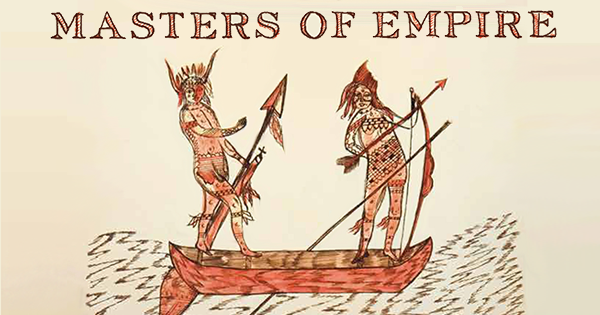Masters of Empire
Read an excerpt from Michael A. McDonnell’s new book about Great Lakes Indians

History, they say, is written by the winners, and the history of European settlement in North America is no exception. When the Europeans eventually conquered the continent, the losers, of course, were the Native Americans, who were slaughtered, decimated by disease, and pushed westward from their homelands. It’s a familiar, tragic tale, but one told largely from the victors’ perspective.
As Michael A. McDonnell contends in Masters of Empire: The Great Lakes Indians and the Making of America, “We have for a long time privileged the stories of a handful of European[s],” he writes For the first three centuries after European contact, the Great Lakes remained the province of tribes like the Odawa and Ojibwe, who had the upper hand in their dealings with French and British settlers. Indian and European interaction was not the centerpiece of Native American history, and McDonnell’s revisionist history puts the Great Lakes Indians at the center of their own tale.
For most of the colonial period, Europeans at Michilimackinac were dependent on the Odawa and other Algonquian nations for their very subsistence. They could maintain a tiny post at the strategic crossroads of Michilimackinac only at the invitation of—and as a result of the encouragement of—thousands of Anishinaabeg who lived along the shores of the Lakes nearby. For this reason, the Odawa were able to hold their own and insist on their own terms when it came to dealing with French missionaries, traders, and colonial officials. …
French traders along the St. Lawrence who wanted furs quickly came to realize that they needed the patronage of their Anishinaabe counterparts to survive in the turbulent world of the pays d’en haut. Fortunately for them, well-connected Odawa women … actively sought out fur trade husbands who would be of benefit to their kin relations. And in marrying French traders, Anishinaabe women created expansive kin ship networks that stretched east as well as west and eventually came to encompass peoples and communities that ranged from the Mississippi River to Montreal.
This extensive kinship network, together with the prestige and influence that close relations with French traders brought to the Michilimackinac Odawa offered benefits beyond material goods. Their access to French trade goods enhanced their status in the region and among their own kin. This influence, along with their location at the strategic straits and their mastery of the waters in the region, meant that they were integral to Indian regional diplomacy. Time and again the Odawa brokered peace in the region. Though the French liked to claim the role of peacemakers and mediators among the Indians, the most astute officials realized there could be no lasting peace unless acknowledged there were no more capable people of bringing peace to the pays d’en haut than the Odawa.
Excerpted from Masters of Empire by Michael A. McDonnell, published in December 2015 by Hill and Wang, an imprint of Farrar, Straus and Giroux, LLC. Copyright (C) 2015 by Michael A. McDonnell. All rights reserved.

